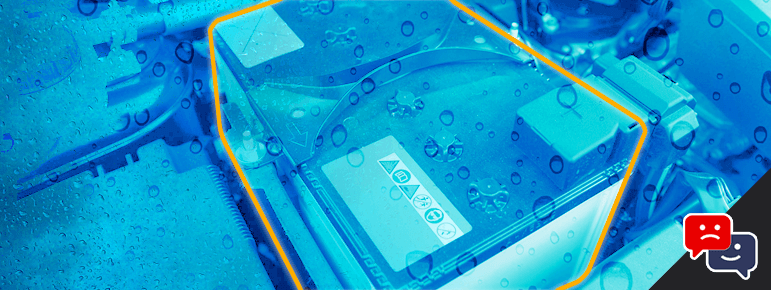Last Updated on April 19, 2024
A car battery is one of the most important components in a motorized vehicle, and in electric vehicles, supplies the power needed to turn the wheels. As such, people are often concerned about exposing the battery to water. Can a car battery get wet?
A car battery is protected with polypropylene, a water-resistant resin casing, and is safe even when exposed to the rain.
Sealed for your protection, a car’s battery is designed not to allow any water inside. Even if you’re jump starting your car in the rain, it’s safe to have your battery exposed to the elements. Just as long as you follow safety protocols when connecting your jumper cables.
Before you panic about damaging this important component of your vehicle, let’s take a look at what can happen when water meets ‘battery power.’
Can You Jump Start a Car when It’s Raining?
Fact is, jump starting a car in the rain is safe. Because the metal leads connecting the two batteries are a much better conductor than the rain water. Rainwater will not affect your car battery or jumper cables, meaning that you won’t electrocute yourself in the rain.
Can You Install a Battery in the Rain?
Not only can you jump start a car, but you can also install a car battery in the rain. While it’s not ideal for visibility reasons, rainwater on your battery will not cause it any harm. Simply put, it won’t conduct electricity from your battery.
Does Rain Harm a Car Battery?
A little rain on your car battery will not detrimentally affect it. However, leaving a battery exposed to the elements for a while can be harmful. Over time, the battery can begin to lose charge due to the corrosion on the terminals. This detrimentally affects the quality of the battery.
Even in this event, however, the battery may still may be usable. Only if the battery is completely submerged in water will it likely become unusable.
Sealed and Vented Batteries
Batteries can be sealed or vented. Sealed batteries don’t allow anything inside. However, a vented battery allows excess gasses to escape by venting through a rubber membrane.
Even with a vented battery, it takes a lot of rainwater exposure before the battery will be damaged.
Final Thoughts: Can a Car Battery Get Wet
The idea that rainwater makes batteries dangerous or causes damage probably stems from the concept that electricity and water don’t mix. The reality is that a battery can get wet for a short period of time and suffer no ill effects.
While it’s not necessarily dangerous to have your car battery exposed to the rain, it’s always a good idea to be safe. Make sure you take all necessary precautions when working with your car battery. This means wearing rubber gloves and using an approved jumper box.
And if you have any doubts at all about whether or not it’s safe to work on your battery in the rain, contact a professional mechanic for assistance.

Managing Editor
Christopher is an automotive technical writer. When he’s not at the local autocross event, he can often be found working on one of his cars. Specializes in automotive class action law, industry trends, and automotive maintenance. Email me direct, or learn more about us

